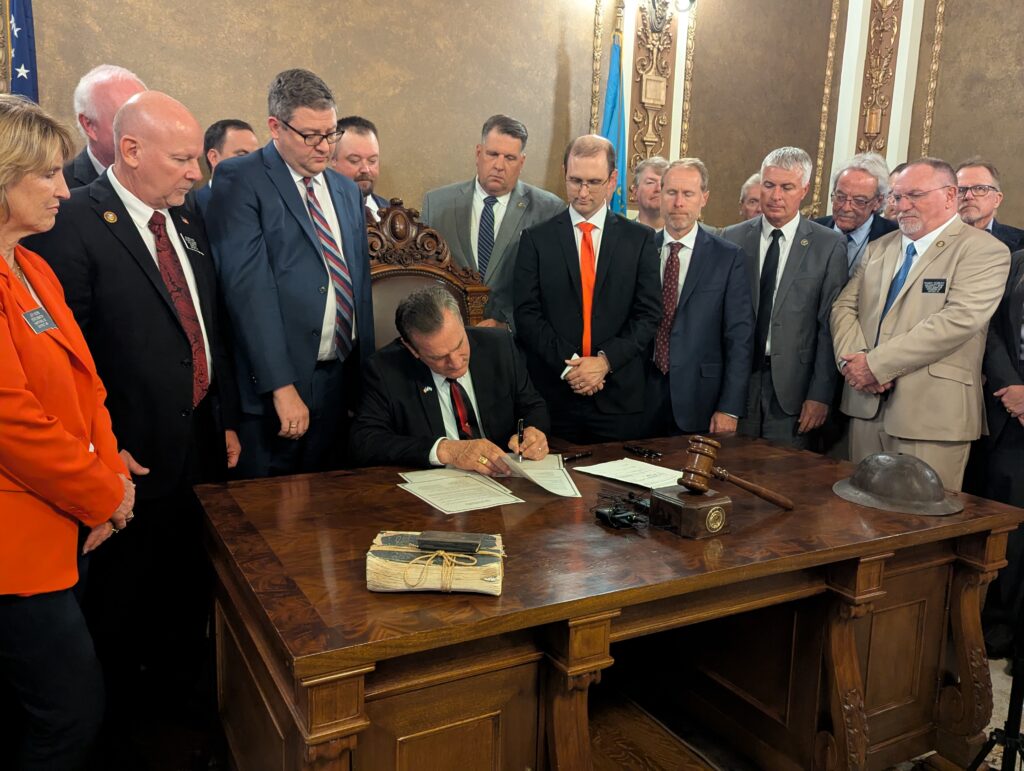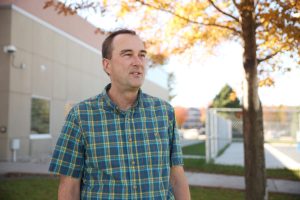Gov. Larry Rhoden, surrounded by legislators and other officeholders and staff, signs an executive order creating a rehabilitation task force on Sept. 23, 2025, at the South Dakota Capitol in Pierre. Moments earlier, Rhoden signed a bill authorizing the construction of a $650 million men’s prison in Sioux Falls. (John Hult/South Dakota Searchlight)
Voices from South Dakota’s Legislature, judiciary, schools, law enforcement, mental health, tribal health and nonprofit spheres will pick up and carry on a conversation about rehabilitation and recidivism that began with a lawmaker-led summer study this year.
Unlike that summer study group, whose members twice met to take testimony on repeat offenses and potential responses to them, the Correctional Rehabilitation Task Force is empowered with the authority to hire consultants to study the issue.
Governor Larry Rhoden established the task force through an executive order on Sept. 23. He signed the order on camera, surrounded by lawmakers and reporters, just moments after signing a bill authorizing the state to begin work on a new 1,500-bed, $650 million men’s prison in northeast Sioux Falls.
South Dakota lawmakers approve $650 million prison construction project in Sioux Falls
His office released the list of task force members on Tuesday. Among them is Rep. Greg Jamison, R-Sioux Falls, who co-led the summer study on rehabilitation.
Instead of producing a final report with findings from that group, Jamison said, the plan is to pass along the information gathered so far to the new task force at its first meeting later this month.
“The idea is to hand our baton off to them so the new task force can finish it,” Jamison said.
Lt. Gov. Tony Venhuizen, who will lead the task force, confirmed in an email to South Dakota Searchlight that he aims to “find a way to coordinate our work with the summer study,” and that the details and dates for meetings are in the works.
From Jamison’s perspective, the new group’s membership across the executive, judicial and legislative branches and its inclusion of voices from outside the government means a wider range of institutional knowledge. The summer study group and the Project Prison Reset task force that voted to recommend the prison plan both heard from inmates and family members who asked for the inclusion of their perspectives.
Erik Bringswhite will offer a line to that community on the new task force. Bringswhite is founder and leader of a Rapid City-based nonprofit called I Am Legacy to help those returning to their communities from prison.
Bringswhite spent time in federal prison in the early 2000s, and others who work for or volunteer with his group have similar experiences. There are many barriers to reintegration, Bringswhite said, from housing to employment to things as simple – to those who’ve never been incarcerated, anyway – as getting an ID card or setting up appointments for medication.
“We know what that looks like and where those services are provided,” Bringswhite said.
The group has four reentry outreach workers to help on that side, and another four “violence interruptors” who aim to intervene in situations before a felony arrest might occur.
He’d like to see closer collaboration between law enforcement and nonprofits like his on the front end, because “incarceration isn’t strengthening our country.”
“I’m hoping that this correctional rehabilitation task force is here to disrupt the cycle,” Bringswhite said.
On the day Rhoden announced the task force’s membership, Stateline published a story on incarceration, based on Bureau of Justice Statistics data from fiscal year 2023. It showed a nationwide increase in imprisonment over 2022, and that South Dakota had the third-highest increase in imprisonment during that time frame, behind Maine and New Mexico.
That data put South Dakota’s federal and state prison population at 3,764. As of Sept. 30 of this year, the South Dakota Department of Corrections was housing 3,839 inmates. The Federal Prison Camp at Yankton, the state’s only federal prison facility, listed a population of 495 on its website as of Tuesday.
Members of the South Dakota Correctional Rehabilitation Task Force
- Lt. Governor Tony Venhuizen, Chair;
- Mayor of Sioux Falls Paul TenHaken;
- Judge Pat Pardy, Third Judicial Circuit;
- Senate President Pro Tempore Chris Karr, R-District 11;
- Senator Tamara Grove, R-District 26;
- Senator Joy Hohn, R-District 9;
- Senator Paul Miskimins, R-District 20;
- Senator Ernie Otten, R-District 6;
- Senator Sue Peterson, R-District 13;
- Senator Jamie Smith, D-District 15;
- Representative John Hughes, R-District 13;
- Representative Greg Jamison, R-District 12;
- Representative Chris Kassin, R-District 17;
- Representative Brian Mulder, R-District 11;
- Representative Tim Reisch, R-District 8;
- Representative Tesa Schwans, R-District 9;
- Representative Eric Emery, D-District 26A;
- Representative Kadyn Wittman, D-District 15;
- Minnehaha County State’s Attorney Danial Haggar;
- Pennington County Sheriff Brian Mueller;
- Southeast Technical College President Cory Clasemann;
- Minnehaha County Jail Warden Mike Mattson;
- State Court Administrator Greg Sattizahn;
- Sioux Falls City Council member Rich Merkouris;
- Founder of I.Am.Legacy Erik Brings White;
- CEO of Great Plains Tribal Leader’s Health Board Jerilyn Church;
- Executive Director of SD Council of Mental Health Centers Terry Dosch;
- Sioux Falls School Board Member Dawn Marie Johnson;
- Secretary of Labor and Regulation Marcia Hultman; and
- Department of Corrections Deputy Secretary Brent Fluke.






